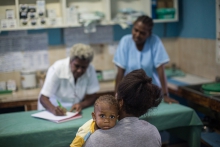Open letter: Nurses, Midwives and Healthcare workers speak out against aspects of the TPP

Open Letter to Trade Ministers, Prime Ministers / Presidents of Trans Pacific Partnership Countries and to the People of their Communities
Nurses, Midwives and Healthcare workers speak out for the sake of their communities’ health against aspects of the TPP
As nurses, midwives and healthcare workers one of the most important aspects of our role is that of health advocacy. It is our role to speak on behalf of our patients and communities to ensure that their care needs are met. International trade agreements affect health services and the personnel who deliver them.
We are concerned that the proposed Trans Pacific Partnership (TPP), an international trade agreement being negotiated in secret, poses risks to the health services our communities rely on and will limit governments’ ability to act in the public’s best interests.
Risks arise through changes to patents on medicines and biologics, through attacks on government pharmaceutical benefits schemes and through restrictions on food labelling laws.
If our governments agree to allowing the extension of monopolies on medicines and biologics our communities will have to wait longer for, or never see, generic and affordable medicines. This will limit our ability to treat and manage disease, and will increase the costs of medicines for individuals and governments. This is contrary to the principles of universal healthcare, so we oppose the TPP.
We are concerned that under the TPP pharmaceutical manufacturers will be allowed greater influence into the decision-making processes of government bodies that subsidise medicines. If this occurs there is a risk that governments may not be able to contain costs effectively and make medicines available to the community at affordable prices. Company profit must not be placed above the health needs of our communities and so we oppose the TPP.
Food labelling allows consumers to make informed decisions about their purchase choices. With primary health drives focusing on reducing obesity, cardio and cerebrovascular disease and diabetes, food labelling provides consumers with the information they need. To restrict governments’ ability to bring in stronger requirements for labelling on food and alcohol, or to limit appropriate warnings, is to the detriment of our communities and so we oppose the TPP.
As nurses, midwives and healthcare workers we know that the biggest improvements in healthcare haven’t always come through new medicines or new procedures. In fact some of the biggest improvements in population health come through legislation in non-health areas. Examples such as minimum drinking ages, compulsory seat belts, un-leaded petrol and minimum living wages have massive impacts on the improvement in our health status. The inclusion of Investor State Dispute Settlement (ISDS) clauses in the TPP will allow multinationals to sue governments. Cases such as Eli-Lily v Canada and Phillip-Morris v Australia show why we oppose the inclusion of Investor State Dispute Settlement (ISDS) clauses in trade agreements. ISDS will mean that governments are less likely to legislate for change for fear of being sued in areas where such legislation might affect the profits of big business. We cannot support this and so we oppose the ISDS provisions in the TPP.
Health is everyone’s concern and decisions about our communities’ healthcare should be openly and democratically decided, not traded in secrecy. We cannot accept a situation where pharmaceutical manufacturers and multinationals have a say in the content of the TPP but our communities do not, where decisions about our healthcare systems are traded in the interests of profit. For these healthcare reasons alone we call on our trade ministers and all government leaders to withdraw from the TPP negotiations until such time that the text has been released, the health impacts openly examined and the matters debated in our parliaments.
The following organisations endorse this letter and ask that you act in the interest of healthcare:
|
Country |
Organisation |
|
Global |
Public Services International |
|
New Zealand |
New Zealand Nurses Organisation |
|
New Zealand |
Te Rūnanga o Aotearoa |
|
New Zealand |
Midwifery Employee Representation and Advisory Service (MERAS) |
|
New Zealand |
New Zealand College of Midwives |
|
New Zealand |
New Zealand Public Service Association |
|
Australia |
New South Wales Nurses and Midwives’ Association |
|
Australia |
Australian College of Midwives |
|
Australia |
Australian Nursing and Midwifery Federation |
|
Japan |
JICHIRO (All Japan Prefectural and Municipal Workers' Union) |
|
Japan |
JHCWU (Japan Health Care Workers' Union) |
|
Canada |
CSQ's Fédération de la Santé du Québec (FSQ-CSQ) |
|
Chile |
Federacion Nacional de Prefesionales Universitarios de Servicios de Salud (FENPRUSS) |
|
Mexico |
Sindicato Unico de Trabajadores del Gobierno de Distrito Federal (SUTGDF) |
|
Peru |
Federacion Centro Union De Trabajadores Del Seguro Social De Salud - Essalud (FED- CUT ESSALUD) |
|
United States |
National Nurses United |
|
United States |
American Federation of State, County and Municipal Employees |
|
United States |
American Federation of Teachers (AFT)-Nurses and Health Professionals |
For more information:
- See PSI's Press release
- Download a PDF of the open letter in English - Français - Español - 日本語
- Australian Health Impact Assessment of the Proposed Trans-Pacific Partnership Agreement
- See PSI's work on Trade agreements, TiSA and TPP

